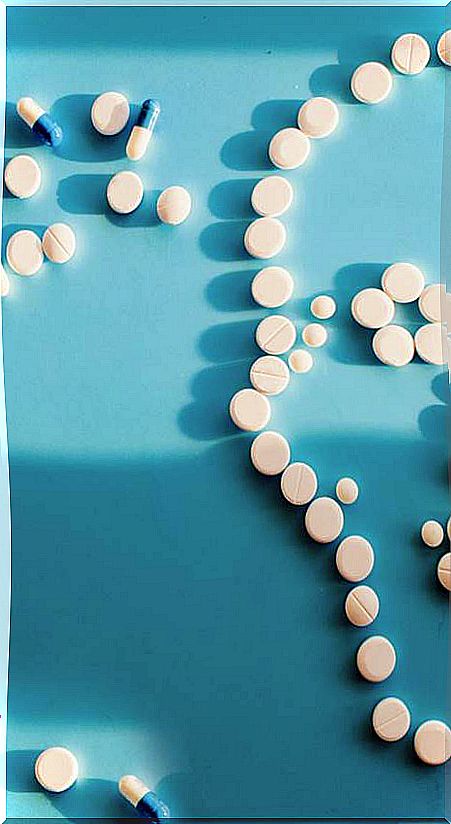Will I Be Able To Stop The Drugs? We Answer A Frequently Asked Question
Sometimes they are a crutch and sometimes an “emotional straitjacket” to protect us, not to go to the clouds or the wells. But we end up depending on its effects

Seven years ago (I was 26), my parents and my sister died in a car accident. I was not going with them. Just the following month, I lost the job I had as an intern. And … everything fell apart. I was diagnosed with bipolar disorder, which I undoubtedly had before but had never manifested in that way. I started taking lithium and stabilized. Since then, when I have thought I was fine, I have tried to stop the medication. But just do it to start a self-destructive spiral. Will I ever be able to stop taking medication? And if you can, how should you do it?
We have read your story carefully and it seems to us that the best answer is not to tell you when or how you should abandon lithium treatment without suffering that “self-destructive spiral” that you have already experienced when leaving it previously. We believe that it is more prudent and it may be much more useful for you to talk with you about the issue that concerns you with a slightly broader focus.
In the first place, we are struck by the fact that the reference to the loss of the three relatives, your parents and your sister, is related in passing, as if it were one more biographical fact in your life. Perhaps there are specialists who see it this way, but we do not believe that you can feel it that way. Therefore, we do not know how you lived that loss: three close relatives disappear from your life overnight in an accident!
Maybe you were very sad and broken for the first few days or weeks. Maybe later you decided on your own or on the advice of others to face the loss “pulling forward”, as if saying to yourself: “You have to overcome this situation, you have to move forward, you have to continue, you cannot stay all day licking your wounds, regretting your losses…”.
But there are many ways to “get out” and many ways to “pull forward.”
One of the most typical is to deny, try not to think about what that (or other previous events) affected you and even still affects you.
One remedy for this “keep going” is antidepressants, lithium, and other drugs. Sometimes they are essential, but they tend to lead us to a kind of pseudo-strength that leads us to cover a deep and painful emotional hole with continuous, stimulating activities and relationships that stop thinking … Or with drugs.
Psychopharmaceuticals: to what extent do they generate addiction?
Lithium and antidepressants help keep you in a euthymic, “normal” mood, neither high nor low, less painful. Lithium, in particular, can help you not go through the clouds or through the wells of other affective states. It probably helps you avoid falling into those self-destructive spirals …
But we wonder why you have a tendency to go through the roof. Perhaps, as many specialists will tell you, you have vulnerabilities for it, or even suffer from bipolar disorder. But perhaps also, in that “going through the clouds”, or in that “sinking into the wells”, influence the way you had to avoid an excessively painful reality that could not be elaborated at the time, when you lost those three relatives .
You could not build within yourself a more solid emotional substrate, and the treatment is your crutch, and sometimes your “emotional straitjacket”, with which you try to protect yourself so as not to go to the clouds – the manic episodes – or to the wells –Depressive episodes. You are terrified of quitting and now you depend on its effects, both biochemical and psychological. In a way, it’s your drug.
So what to do? Above all, do not stop taking these drugs on your own, although you can learn much more about them thanks to books such as the one by psychopharmacologist Joanna Moncrieff (Speaking clearly , Herder); Consult with a specialist who knows psychopharmacology, but is also in contact with the forms of psychotherapy that exist for your situation: they can help you directly and they can help your family and friends to know what to do to help you when the clouds ”or“ you sink in the well ”.
Not just anyone can do it, but there are specialists trained in individual help, group help and family help that will be essential if you want to depend less on psychotropic drugs, whether you have to continue taking them or not.
Connecting with ourselves
It is about helping you to reposition in your mind, in your cognitive and affective schemes, what has happened to you with your relatives, with other events in your life, lithium, relatives, work, personal relationships … And not just past events, but, above all, current and future personal relationships. That is what psychotherapy does, which in cases like yours possibly has to be individual and family separately: on the one hand with you; and on the other, with you, your family and those close to you so that they know how to help you when you “go through the roof”. That is what a well-trained psychotherapist does.
In the same way, we should not ingest lithium or any other psychoactive drug because it has been recommended to us by a doctor, a nurse, a family member or a friend. With few exceptions, it should only be prescribed by a trained psychiatrist and, in some cases, by your GP or family doctor.
Learning with the help of a psychotherapist and psychiatrist to stop at what worries, saddens or stimulates you at the present moment could help to build a more consistent emotional substrate and try to stop lithium.
In short, depend more on your inner security to depend less on extrinsic biochemical or social aids.









